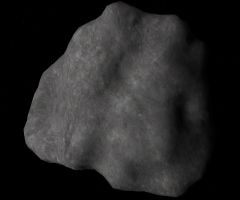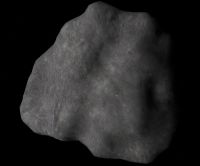Difference between revisions of "6489 Golevka"
Jump to navigation
Jump to search
(Arvil moved page User:Arvil/Sandbox02 to 253 Mathilde: Move to article page.) Tag: New redirect |
(Created page.) Tag: Removed redirect |
||
| Line 1: | Line 1: | ||
| − | + | {| cellpadding="2" cellspacing="0" style="margin:25px 0 0 10px; border:3px solid lightsteelblue;width:250px; font-size:90%; font-family:'Arial','Helvetica'; float: right; clear: right;"Template in Orbiter" | |
| + | !bgcolor="lightsteelblue" colspan="2" align="center" |6489 Golevka | ||
| + | |- | ||
| + | |colspan="2" align="center"|[[Image:Golevka-AsteroidPackv1zip-Orbiter2003P2.jpg|240px]] | ||
| + | |- | ||
| + | |colspan="2" align="center"|'''6489 Golevka from ''AsteroidPack_v1.00.zip'' in Orbiter 2002P3''' | ||
| + | |- | ||
| + | !bgcolor="lightsteelblue" colspan="2"|Designation | ||
| + | |- | ||
| + | |Name||align="right"|6489 Golevka | ||
| + | |- | ||
| + | |width="30%"|Reference body||align="right" width="30%"|[[Sun]] | ||
| + | |- | ||
| + | !bgcolor="lightsteelblue" colspan="2"|Planetary mean orbits | ||
| + | |- | ||
| + | |width="30%"|Epoch||align="right" width="50%"|2006 | ||
| + | |- | ||
| + | |width="30%"|Semimajor axis (a)||align="right" width="50%"|373579090299.078 m | ||
| + | |- | ||
| + | |width="30%"|Eccentricity (e)||align="right" width="30%"|0.605398743001474 | ||
| + | |- | ||
| + | |width="30%"|Inclination (i)||align="right" width="30%"|2.277453662° <br> (0.0397490649683287 radian) | ||
| + | |- | ||
| + | |width="30%"|Longitude of the ascending node (LAN, ☊)||align="right" width="30%"|210.9561133° <br> (3.68187875421545 radian) | ||
| + | |- | ||
| + | |width="30%"|Longitude of periapsis (ϖ)||align="right" width="30%"|277.7770709° <br> (4.84812447436596 radian) | ||
| + | |- | ||
| + | |width="30%"|Mean longitude (L)||align="right" width="30%"|509.5582618° <br> (8.8934693997637 radian) | ||
| + | |- | ||
| + | !bgcolor="lightsteelblue" colspan="2"|Selected physical parameters | ||
| + | |- | ||
| + | |width="30%"|Mean radius||align="right" width="30%"|14000 km | ||
| + | |- | ||
| + | |width="30%"|Mass||align="right" width="30%"|2.1×10<sup>11</sup> kg | ||
| + | |- | ||
| + | !bgcolor="lightsteelblue" colspan="2"|Rotation elements | ||
| + | |- | ||
| + | |width="30%"|SidRotPeriod||align="right" width="30%"|21695.04 seconds (6.0264 hours) | ||
| + | |- | ||
| + | |width="30%"|SidRotOffset||align="right" width="30%"|0 | ||
| + | |- | ||
| + | |width="30%"|Obliqutiy||align="right" width="30%"|0 | ||
| + | |- | ||
| + | |width="30%"|LAN||align="right" width="30%"|0 | ||
| + | |- | ||
| + | |width="30%"|Note||align="right" width="30%"|*Elements given are from 6489 Golevka.cfg (AsteroidPack_v1.00.zip) | ||
| + | |} | ||
| + | |||
| + | '''6489 Golevka''' is a prograde asteroid that was discovered by [[w:Eleanor F. Helin|Eleanor F Helin]] in November 1885. Golevka | ||
| + | |||
| + | == 6489 Golevka in Orbiter == | ||
| + | 6489 Golevka was first introduced with the release of AsteroidPack_v1.00.zip in November 2004. Note that the landing surface as given in the config file is spherical, but the visual of Juno is not, if you land, you will likely be above or below the visual surface. | ||
| + | |||
| + | {| class="wikitable" style="text-align: center" | ||
| + | |colspan="8"|<center>'''Orbiter versions and add-ons which include Golevka'''</center> | ||
| + | |- | ||
| + | !Add-on!!Source!!Version!!Author!!Type!!Release Date!!Compatibility!!Wiki article | ||
| + | |- | ||
| + | |[https://www.orbiter-forum.com/resources/asteroid-pack-1-00.2832/ Asteroid Pack 1.00]||O-F Resources||2004-11-21||Nighthawke||Scenery||21 November 2004|||| | ||
| + | |} | ||
| + | == See also == | ||
| + | [[w:6489 Golevka|6489 Golevka]] at [[w:Wikipedia|Wikipedia]] | ||
| + | |||
| + | == Gallery == | ||
| + | <gallery widths="200" heights="200"> | ||
| + | Golevka-AsteroidPackv1zip-Orbiter2003P2.jpg|<center>6489 Golevka from ''AsteroidPack_v1.00.zip'' in Orbiter 2003P2</center> | ||
| + | Asteroid-golevka.jpeg|<center>Computer generated images of Golevka based on [[w:Arecibo Observatory|Arecibo]] radar data<br>from Wikimedia Commons</center> | ||
| + | </gallery> | ||
| + | |||
| + | {{SolarSystem}} | ||
| + | |||
| + | {{Stub}} | ||
| + | |||
| + | [[Category:Articles|Golevka]] | ||
| + | [[Category:Celestial bodies|Golevka]] | ||
| + | [[Category:Solar System|Golevka]] | ||
| + | [[Category:Main Belt Asteroids|Golevka]] | ||
Revision as of 03:12, 13 September 2024
| 6489 Golevka | |
|---|---|

| |
| 6489 Golevka from AsteroidPack_v1.00.zip in Orbiter 2002P3 | |
| Designation | |
| Name | 6489 Golevka |
| Reference body | Sun |
| Planetary mean orbits | |
| Epoch | 2006 |
| Semimajor axis (a) | 373579090299.078 m |
| Eccentricity (e) | 0.605398743001474 |
| Inclination (i) | 2.277453662° (0.0397490649683287 radian) |
| Longitude of the ascending node (LAN, ☊) | 210.9561133° (3.68187875421545 radian) |
| Longitude of periapsis (ϖ) | 277.7770709° (4.84812447436596 radian) |
| Mean longitude (L) | 509.5582618° (8.8934693997637 radian) |
| Selected physical parameters | |
| Mean radius | 14000 km |
| Mass | 2.1×1011 kg |
| Rotation elements | |
| SidRotPeriod | 21695.04 seconds (6.0264 hours) |
| SidRotOffset | 0 |
| Obliqutiy | 0 |
| LAN | 0 |
| Note | *Elements given are from 6489 Golevka.cfg (AsteroidPack_v1.00.zip) |
6489 Golevka is a prograde asteroid that was discovered by Eleanor F Helin in November 1885. Golevka
6489 Golevka in Orbiter
6489 Golevka was first introduced with the release of AsteroidPack_v1.00.zip in November 2004. Note that the landing surface as given in the config file is spherical, but the visual of Juno is not, if you land, you will likely be above or below the visual surface.
| Add-on | Source | Version | Author | Type | Release Date | Compatibility | Wiki article |
|---|---|---|---|---|---|---|---|
| Asteroid Pack 1.00 | O-F Resources | 2004-11-21 | Nighthawke | Scenery | 21 November 2004 | ||
See also
Gallery
Computer generated images of Golevka based on Arecibo radar data
from Wikimedia Commons
| edit The Solar System | |
|---|---|
| Central star |
Sun (Sol) |
| Planets |
Mercury - Venus - Earth - Mars - Jupiter - Saturn - Uranus - Neptune |
| Natural satellites |
Moon - Phobos - Deimos - Io - Europa - Ganymede - Titan - more... |
| Add-ons |
Planets - Dwarf Planets - Small objects - Natural satellites - Alternative star systems |

